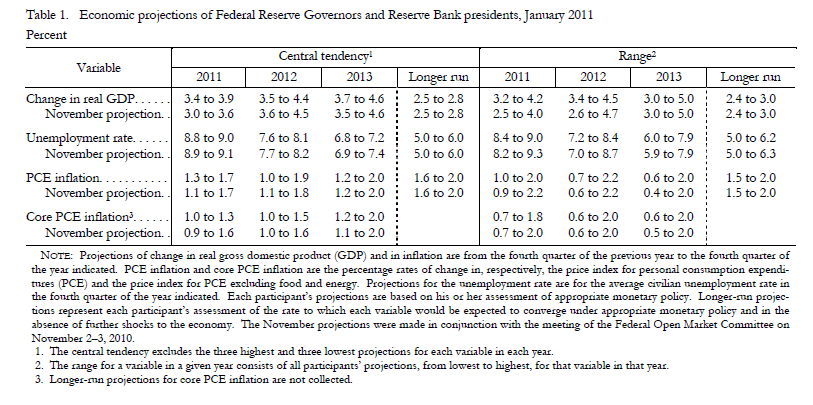Fed Upgrades U.S. GDP Growth Forecast, Remains Significantly Concerned About Unemployment
Economics / US Economy Feb 17, 2011 - 03:12 AM GMTBy: Asha_Bangalore
 The minutes of the January FOMC meeting show the Fed more optimistic about economic growth in 2011. The Fed raised the central tendency for real GDP growth in 2011 to 3.4% - 3.9% from the November forecast of 3.0% to 3.6% (see Table 1). The revisions to projections of economic growth in 2012 and 2013 were small compared with the revision of estimates for 2011.
The minutes of the January FOMC meeting show the Fed more optimistic about economic growth in 2011. The Fed raised the central tendency for real GDP growth in 2011 to 3.4% - 3.9% from the November forecast of 3.0% to 3.6% (see Table 1). The revisions to projections of economic growth in 2012 and 2013 were small compared with the revision of estimates for 2011.
Consistent with the upward revision of real GDP, the unemployment rate was lowered from the November prediction. However, the unemployment rate remains at an elevated level of 8.8% to 9.0% in the fourth quarter of 2011. Predictions of inflation, overall and core, were both raised slightly for the entire forecast period.

Source: http://www.federalreserve.gov/monetarypolicy/files/fomcminutes20110126.pdf
Most members continue to hold that there is a great deal of uncertainty still. The minutes listed five major sources of uncertainty - (1) the nature of economic recoveries after financial crisis, (2) the effects of unconventional monetary policies, (3) structural problems in the labor market, (4) the future path of fiscal policy, and (5) global economic outlook. Despite these significant sources of concern, most members view that risks are broadly balanced with regard to real GDP growth. This is marked change from the view held in November, when most members held the opinion that downside risks to economic growth by far outweighed the upside risks. Pent-up demand and increased ease of credit availability were cited as factors leading to stronger-than-expected growth. Budgetary woes of state and local government translating to a decline in their spending that exceeded expectations, lower house prices and its attendant adverse consequences on household balance sheets and spending, and significantly slow improvements in the labor market which would raise household savings and reduce spending were seen as factors that could stall economic growth.
With regard to the labor market, although the outlook for the unemployment rate was balanced, members noted that if firms are pessimistic about underlying economic conditions and remain reluctant to increase payrolls, the pace of decline of the jobless rate would be less than the current prediction. The staff presented the current status of research about structural unemployment in the January deliberations. The main conclusion was that structural unemployment had risen but by less than actual increase in the unemployment rate. The minutes also noted that many factors that accounted for the increase in structural unemployment would "recede over time." The discussion also mentioned that mismatches of labor skills and "hiring practices" could not be solved by monetary policy. A few others hold that under current conditions monetary policy still had a positive role to play in reducing joblessness.
On the inflation front, compared with the assessment in November, the probability of deflation had dropped significantly. A few members saw upside emanating from the large size of the Fed's balance sheet. The persistent gap between the jobless rate and the long-run benchmark was seen as source for inflation to be lower than projected. A few members noted that higher energy and commodity prices presented an inflationary risk. Others added that there is only small pass-through of these higher prices to overall consumer price indexes.
Given the nature of economic conditions, the Fed plans to complete its purchases of longer dated Treasury securities. The minutes indicate a difference in opinion about quantitative easing, with some members suggesting a reduction as economic conditions improve, while others were unsure about the impact and held that the program should continue. A few others indicated that it was not likely that economic conditions would change sufficiently to justify a termination of the second round of quantitative easing.
Asha Bangalore — Senior Vice President and Economisthttp://www.northerntrust.com
Asha Bangalore is Vice President and Economist at The Northern Trust Company, Chicago. Prior to joining the bank in 1994, she was Consultant to savings and loan institutions and commercial banks at Financial & Economic Strategies Corporation, Chicago.
Copyright © 2011 Asha Bangalore
The opinions expressed herein are those of the author and do not necessarily represent the views of The Northern Trust Company. The Northern Trust Company does not warrant the accuracy or completeness of information contained herein, such information is subject to change and is not intended to influence your investment decisions.
© 2005-2022 http://www.MarketOracle.co.uk - The Market Oracle is a FREE Daily Financial Markets Analysis & Forecasting online publication.



